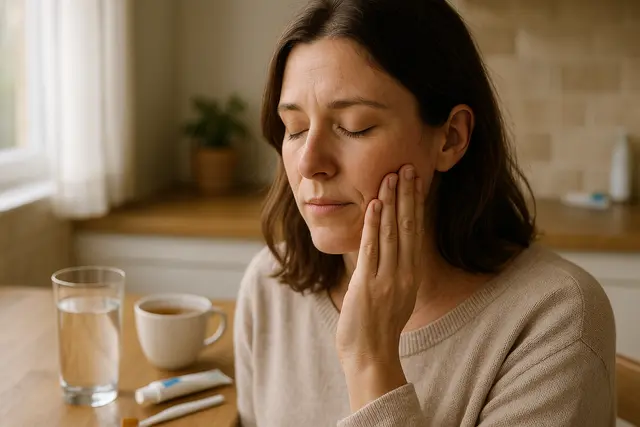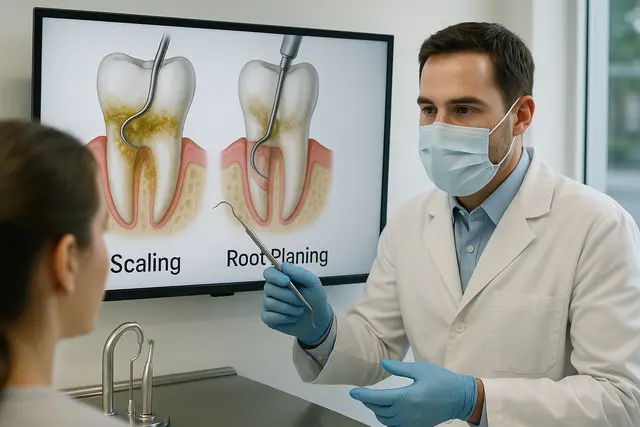General Dentistry
6 min read
May 20, 2025
How Long Does a New Patient Dentist Appointment Take?
Wondering how long your first dentist appointment will take? You’re not alone. Whether you’re switching providers or it’s been a while since your last visit, that initial new patient experience can feel like a big unknown. The good news? It’s straightforward, thorough, and sets the tone for your oral health journey.

You finally scheduled that new patient dentist appointment. Maybe it’s been a while since your last visit (no judgment), or maybe you’ve just moved and need a new dental home base. Either way, there’s one question floating around in your mind: how long do dentist appointments take, especially your first one?
Good news: it won’t last forever. But it’s not just a quick in-and-out either. A first dental appointment is more than just a peek at your teeth. It’s a full-on assessment of your oral health, like a dental version of a health reset button. So if you’re trying to plan your day, or just avoid awkwardly waiting in the lobby wondering what comes next, here’s the breakdown.
What Happens During a New Patient Dentist Appointment?
A new patient appointment is basically your dentist’s way of getting to know you and your teeth. It's not just about spotting a cavity or scraping off a bit of plaque, though that’s definitely part of it. It’s about creating a baseline for your dental care, checking for gum disease, and making sure your oral health is headed in the right direction.
Expect a warm welcome (hopefully with less of that infamous waiting room music), followed by some quick paperwork if you haven’t filled it out online. The dental professionals will review your dental history and your medical history. This gives them insight into any conditions that might affect your dental health, like diabetes or medications that dry out your mouth (which can sneakily lead to gum trouble).
Let’s Talk About Time: How Long Does the Appointment Take?
Most new patient appointments last between 60 minutes to an hour and a half. That sounds like a stretch, but here’s why: it’s not just one thing happening. It’s a comprehensive dental experience that includes a dental cleaning, a comprehensive exam, and often, a set of x-rays.
If it’s been a few years since your last dental visit, or you’ve had some dental issues in the past, expect a slightly longer appointment. That’s because your dentist may need more time to check for periodontal problems, tartar buildup, or other dental conditions.
So, the total appointment time? Block out about 90 minutes just to be safe. It’s easier for you to fit it into your schedule that way, without the stress of rushing to your next errand.
What to Expect at Your First Dental Appointment
There’s no mystery here, your first appointment is all about gathering information and laying a foundation for your future dental care. Your dental hygienist will usually start with x-rays, giving your dentist a peek beneath the surface. They’ll look for signs of gum disease, hidden cavities, bone loss, and even early signs of infection that aren’t yet causing pain.
Then comes the thorough cleaning. The hygienist will clean your teeth by removing built-up plaque and tartar, especially from those hard-to-reach spots that even the most enthusiastic brushers and floss-fanatics miss. If it’s been a while since your last visit, this part might take longer. But trust us, it’s worth it.
The dentist will also do a comprehensive exam that includes checking your bite, an examination of your jaw, and sometimes an oral cancer screening. It’s not just about your teeth and gums, it’s about your overall oral health.
How Often Should You Visit the Dentist?
We get it, visiting the dentist might not be your favorite hobby. But regular visits are an important part of maintaining not just healthy teeth, but a healthy you. Most people should see their dentist every six months. If you’ve got a history of gum disease, cavities, or periodontal disease, you might need more frequent visits to the dentist.
These regular dental appointments help catch small dental problems before they turn into big ones. Because trust us, catching a cavity early is way easier (and cheaper) than needing a root canal down the line.
What If the Dentist Finds Something?
Here’s where things might extend your time a bit or require multiple appointments. If your dentist finds something unexpected, like a cavity, signs of gum disease, or anything that needs a closer look, they’ll walk you through your treatment plan. This might involve a quick filling, a deeper periodontal cleaning, or something more involved, like a dental procedure.
Don’t worry, though. Your dentist will give you all the details. They’ll talk through options, schedule any follow-up appointments, and help you figure out what’s appropriate treatment for your situation. No pressure, just smart planning.
What If You Have Dental Insurance?
Let’s talk real life: dental insurance can be a lifesaver. Before your first visit, it’s smart to check what your plan covers. Most dental offices will verify your benefits ahead of time, so you’re not caught off guard at the front desk.
Your first dental appointment often includes x-rays, a dental cleaning, and the exam, which are usually covered in full for new patients. But if you need extra work, like a cavity filled or a root canal, your insurance may only cover part of it. Good dental practices will walk you through costs before doing anything, so you can make informed choices.
Why Do Some Appointments Take Longer?
There are a few reasons your appointment time might run long. Maybe you haven’t been to the dentist in a while. Maybe your last visit was fine, but since then, you’ve noticed some bleeding when brushing. Or maybe this is your first time ever getting a full set of dental x-rays or a cancer screening.
Longer appointments are often a sign your dental group is being thorough, which is a good thing. Rushed visits leave room for missed dental conditions. And if you’ve got specific concerns, like a chipped tooth or a question about cosmetic dentistry, that’ll add a few minutes to your chat with the dentist too.
What Should You Do After the Appointment?
At the end of your appointment, your dentist will also help you schedule your next checkup or any other visits needed. If your teeth got a clean bill of health, great, you’re done for six months. If not, your treatment plan may include follow-up appointments to handle the specific dental issues uncovered.
Either way, you’ll walk out with a better understanding of your dental health, hopefully a mouth that feels squeaky clean, and maybe even a free toothbrush. (Hey, small wins.)
Booking Your Appointment Today
Still haven’t scheduled your appointment today? No time like the present. The sooner you come in, the easier it is to stay on top of common dental concerns like plaque, tartar, and potential gum disease. Whether it’s been six months since your last visit or six years, you’ll be in good hands with a trusted dental practice.
Just make sure to give yourself enough time, appointments last anywhere from 60 minutes to an hour and a half. If that sounds like a lot, think of it this way: it’s a small time investment for a future without toothaches or surprise dental procedures.
So, call your regular dentist, pick a time, and take the first step toward healthier teeth and gums. You’ll be glad you did.
And maybe, just maybe, you’ll even look forward to the next one.
How Long Does a New Patient Dentist Appointment Usually Take?
A new patient dental appointment typically lasts between 60 to 90 minutes. This includes time for paperwork, x-rays, a comprehensive exam, and a full dental cleaning. If it’s been a while since your last visit or if you have specific concerns, the appointment may take a bit longer.
What Happens During a First-Time Dental Visit?
During your first appointment, your dentist will review your medical and dental history, take x-rays, and perform a thorough cleaning. They’ll also examine your teeth, gums, bite, and jaw, and may conduct an oral cancer screening. The goal is to create a baseline for your oral health and identify any existing or potential issues.
What If the Dentist Finds a Problem During the Visit?
If your dentist discovers a cavity, gum disease, or any other dental issue, they’ll explain your treatment options and help schedule any follow-up care. This could include anything from a filling or deep cleaning to more involved procedures. You’ll receive a clear treatment plan with costs explained upfront.
Does Dental Insurance Cover First Appointments?
Most dental insurance plans cover a new patient exam, x-rays, and a standard cleaning at 100%. However, if additional treatment is needed, such as a filling or a deep cleaning, there may be out-of-pocket costs. Your dental office can usually check your benefits and explain what’s covered before any treatment begins.
Read Next
Related Posts

General Dentistry
How to Stop Nerve Pain in Tooth: Fast Relief That Works
Tooth nerve pain can be one of the most intense and disruptive types of discomfort. It often strikes without warning and makes everyday activities like eating, drinking, or even talking feel unbearable. Understanding what causes this pain and how to manage it effectively is key to getting fast relief.
4 min read
Sep 15, 2025

General Dentistry
Can a Sinus Infection Make Your Jaw Hurt? Understanding the Connection
Jaw pain can be unsettling, especially when it seems to appear out of nowhere alongside a stuffy nose or headache. Many people are surprised to learn that sinus infections can cause discomfort that feels like it’s coming from the jaw. Understanding the connection between your sinuses and jaw pain is key to getting the right treatment.
5 min read
Sep 15, 2025

General Dentistry
What Is SRP in Dentistry? A Complete Guide to Scaling and Root Planing
When it comes to dental health, most people think regular cleanings are enough to keep their smile safe. But sometimes, what’s happening below the gumline needs more attention. Scaling and root planing (SRP) is a treatment designed to address gum disease at its source, protecting both your gums and teeth from long-term damage.
5 min read
Sep 10, 2025
Don’t have time to research every dentist around you?
See why 30k+ patients trusted us